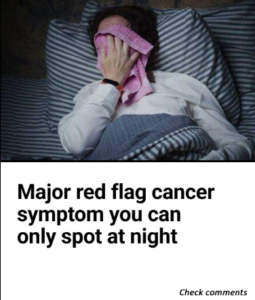Cancer is a difficult diagnosis to face, but early detection is key to improving treatment outcomes. While many cancer symptoms are obvious during the day, there’s one major red flag that can often only be spotted at night—persistent, unexplained night sweats. This symptom is particularly significant because it’s not just caused by common issues like a hot room or heavy blankets, but could indicate something more serious, like cancer.
Night sweats are characterized by excessive perspiration while you sleep, which soaks through clothes and even bed sheets. They are different from feeling warm or getting sweaty from the heat; night sweats occur in a cooler environment and don’t seem to be linked to temperature or physical activity. This symptom can be a red flag for a variety of cancers, particularly lymphoma.
Lymphoma, a type of blood cancer that affects the lymphatic system, is often associated with persistent night sweats. People with lymphoma may experience what is known as “drenching” night sweats, where they wake up in the middle of the night, drenched in sweat, and may have to change clothes or bedding due to how soaked they are. These night sweats often happen without any obvious cause, such as a warm room or heavy blankets, and they might even occur when the person feels chilly in general.
But it’s not just lymphoma—night sweats can be a symptom of other cancers as well, including leukemia, certain types of breast cancer, and even prostate cancer. In some cases, the body’s immune system reacts to the presence of cancer cells by releasing substances called cytokines, which can lead to inflammation and sweating, especially at night.
While night sweats alone may not necessarily indicate cancer, when combined with other symptoms, they can be a major red flag. For example, if night sweats are accompanied by unexplained weight loss, fever, fatigue, persistent pain, or swollen lymph nodes, it’s crucial to seek medical attention. These symptoms may point to cancer, especially when they persist over time and worsen at night.
Night sweats can also be mistaken for other, less serious conditions, such as infections, menopause, or hormone imbalances, which is why it’s important to pay attention to how long the symptoms last and whether they persist in the absence of any obvious triggers. If night sweats are happening consistently for several weeks or more, particularly if they disrupt sleep or are severe enough to cause discomfort, it’s a good idea to consult a healthcare provider to rule out any serious underlying causes.
Ultimately, if you notice night sweats that seem unusual, particularly if they come with other warning signs, it’s important not to ignore them. Early diagnosis and treatment are essential, and while night sweats alone might not be the definitive symptom of cancer, they can be one of the earliest signs, especially in cancers like lymphoma and leukemia. Always trust your body’s signals and seek medical advice if you feel something isn’t right—early intervention is key to improving treatment outcomes and increasing the chances of a successful recovery.

